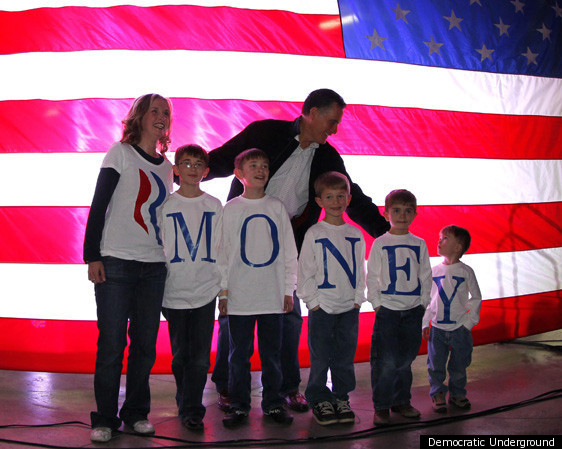
Image Credit: Huffington Post
At issue from the moment Romney stuck his neck out as a Presidential hopeful, his extraordinary personal wealth has become one of the primary issues covered by various news media as we march closer to the November election. Epitomized best, perhaps, by a cleverly Photoshopped image that initially made rounds as a campaign gaff, “RMoney” has anything but hip associations—rather, it has inspired vast discussion about the rhetoric of prosperity and philanthropy in the midst of economic recession, both real and imagined.
A less-addressed topic, I think, is how LDS-sponsored sources can inform this debate as it takes place in the mainstream media. Though Romney is not the first Mormon politician to garner national attention (most recently, Jon Huntsman achieved national recognition; former Michigan governor George Romney, Terrel “Ted” Bell, and Mormon prophet Ezra Taft Benson all held influential cabinet positions in the past), he is arguably the most successful. As such, there has been a resurgence of public interest in Mormonism. The constellation of this interest and the general discussion of the “cult of prosperity” as emblematized in the Occupy protests has resurrected the age-old stereotype of Mormons as wealthy white businessmen—and Mitt Romney, the unexpected champion with the potential of either salvaging or savaging the economy.
Serious discussions of Romney’s finances go as far back in the news archive as early this year, with no little attention paid to his philanthropic contributions, which are outlined to some extent here. Most critics of this breakdown cite the LDS Church as an artificial inflator and use this to deny Romney as a legitimate philanthropist. I’d like to suggest that we consider a different angle of this kind of rhetoric. Rather than addressing where philanthropic money goes, could we not equally question the rhetorical role of philanthropy in political discourse?
I’d like to cite here the search entry for “service” on mormon.org, a website designed for non-church members investigating Mormon belief. The rhetorical focus here is not necessarily on the benefit provided to those who receive charity, but those who give it—as the article asserts,
“Jesus Christ said, "Greater love hath no man than this, that a man lay down his life for his friends.” This doesn't mean we have to die to show our love for our friends. We lay down our lives every time we put someone else's needs before our own. These actions, whether great or small, let us feel the happiness of connecting with our brothers and sisters and remind us that God often allows us to be the answer to someone else’s prayers.”
The emphasis on first person pronouns—we and us—and the lack of third person pronouns create a philanthropist-oriented rhetoric—not one in which the philanthropist is repaying a tangible debt to society, but in which he is repaying an intangible spiritual debt and thus further securing his own happiness. This necessarily reorients the rhetorical situation outside of the immediate--concrete social and political dynamics--into a supernatural realm, even as the superficial rhetoric addresses the need for humanitarian aid. The less obvious implication of this, however, is the way it defines the humanitarian/philanthropist as a catalytic wedge. He is empowered to create and control change, but encouraged to do so on an individual level; thus, he satisfies his obligation to his fellow man but is not encouraged to contemplate the situations by which the imbalance is created.
In this way, comparing the private philanthropic contributions of Obama and Romney is a fruitless exercise when it is really the rhetoric of philanthropy—and I’ve quoted from informal Mormon doctrine above, but the principles are, arguably, extant in nearly every Christian denomination—that is itself the flaw. Without the power to enact systemic change, I would argue, it runs a great risk of further increasing the power discrepancy between the giver and the recipient. For me, there is no amount of philanthropy that can fully mediate wealth on either side, regardless of how it is distributed, as long as this power dynamic remains in play.
Recent comments
2 years 29 weeks ago
2 years 44 weeks ago
2 years 44 weeks ago
2 years 50 weeks ago
3 years 4 weeks ago
3 years 4 weeks ago
3 years 4 weeks ago
3 years 6 weeks ago
3 years 6 weeks ago
3 years 6 weeks ago